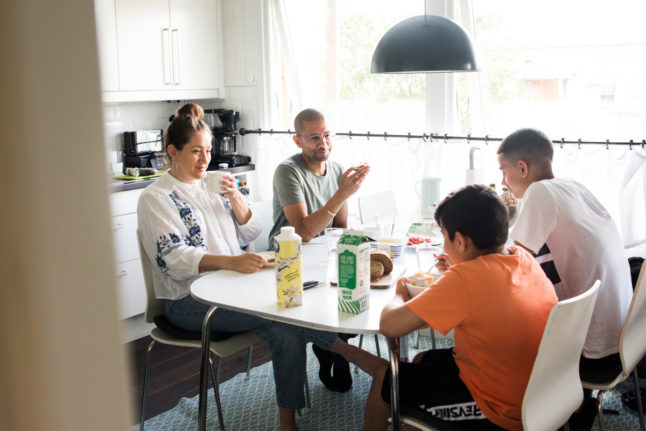There are two types of renting in Sweden.
Residents usually join a “queue” for an elusive first-hand contract, which means you can stay long-term in a rent-controlled property.
But these queues are long, with Swedes typically waiting several years for an apartment and even longer in the most popular areas, meaning the majority of foreigners rent second-hand. This is the Swedish term for subletting, meaning you rent either from someone with a first-hand contract (known as hyresrätt) or from someone who owns their own property as part of a collective (bostadsrätt).
It’s helpful to know which of these applies to your landlord, as some of the guidelines below differ depending on whether they own or rent the property they’re subletting to you.
Never be afraid to assert your rights as a tenant; foreigners are particularly likely to fall prey to scams, as unscrupulous landlords may assume they’re unfamiliar with the Swedish system.
BEFORE YOU MOVE IN:
Check that the landlord has permission to rent
Sweden’s housing regulations are a double-edged sword: on the one hand, they offer a lot of protection, but at the same time that means you have to be sure you’re doing things by the book. The most crucial step would-be tenants should take is confirming the landlord is allowed to rent out the apartment. If they don’t do this and rent to you anyway, they could lose their first-hand contract, invalidating your second-hand contract even if all the other steps have been met.
They should have received permission from their own landlord (if they are renting first-hand, and it’s a hyresrätt apartment) or from the building’s housing association (if they own the apartment, and have a bostadsrätt). This has to be done before you move in: sublets are only permitted if there’s a good reason, such as the owner having a job offer in another city or country. However, it doesn’t apply if you’ll be renting a room or part of an apartment from a live-in landlord, in which case you’re legally a lodger rather than a tenant.
Normally, the sublet will only be approved for one year at a time, so if a job or study programme overseas continues for another year, they’ll have to reapply. Occasionally, for example if the landlord is moving in with a partner, the housing association may say outright that an extension of permission to sublet won’t be possible. So make sure to confirm both that the landlord has received the permission, and whether there are any extra conditions or possibility of extension.
The terms of the contract
Firstly, make sure you have a contract. Oral agreements are still valid, but you’re legally entitled to a written one and should ask for this to avoid disputes later on.
Things that should be included: length of the rental period and notice period, what’s included in the rent, the amount of rent and when it should be paid each month, deposit amount and what you have to do to get it back, and whether you have the right to change anything such as repainting the walls.
If you’re renting a furnished apartment, it’s also a good idea to prepare an inventory of all the items in the apartment, including any flaws that were there when you moved in. And don’t forget to check the essentials are all in there, including the address of the apartment, and both your and your landlord’s names, contact details, and signatures.
Make sure that the rent is reasonable
Yes, renting can cost a lot, but by Swedish law the amount you pay must be “reasonable”. Private individuals in Sweden are actually not allowed to rent out their accommodation solely for profit, so there are caps on how much your landlord charge you. What qualifies as reasonable depends on the type of accommodation and exactly what’s included in your agreement.
The sum you pay will include the basic rent (the amount the landlord pays if they are renting first-hand, a proportion of the total rent if you’re lodging, or an estimate of the cost based on similar apartments if your landlord owns the apartment), plus 10-15 percent if the apartment is furnished, plus extra fees for any other services included in the contract (Internet, a parking space, electricity, TV, etc). If your landlord owns the apartment, they may also add on four percent of the home’s market value to cover the cost of capital.
A good landlord should be happy to show you how they’ve calculated your rent – don’t be afraid to ask for the full breakdown.
WHILE RENTING:
Your right to use of the home
A rental agreement gives you the right to use and live in the home exclusively, which means your landlord may not enter without your permission (though they may have a key). The only exception is if there’s an immediate risk of severe damage to the apartment or people in it, such as a fire or serious leak.
You will likely have to agree to any rules set by the housing association, which may include things like no loud noise after 10pm, no smoking, and no anti-social behaviour.
Having people to stay
The right to use the home includes the right to invite guests over (this may not apply if you’re renting a room as a lodger), but there are a few points to be aware of.
First, no one except the people named on the contract should be living in the apartment full-time.
Secondly, as the named tenant you’re responsible for your guests if they disturb your neighbours or cause any damage to the apartment. And you don’t have the right to sublet the apartment yourself.
If something goes wrong in the apartment
Tenants in Sweden have a right to reasonable living standards, which includes hot and cold water, heating (although note that in many apartment blocks the housing association turns the heating on centrally at a certain date, so you probably won’t be able to turn it on over the summer), a toilet and washing facilities, fridge, and access to a washing machine.
If something goes wrong with any of these items, whether you notice it when you first move in or it stops working at a later date, contact your landlord or speak to the housing association directly. This also applies to problems such as a broken door or window or anything else related to the “outside” or structure of the apartment.
If it gets too hot or too cold
No one wants to be without heating during a Swedish winter, and the right to reasonable living standards outlined above includes specific temperature requirements.
Your apartment should not be any cooler than 18C (16C measured from the floor) or hotter than 24C, aside from short-term changes due to heat waves or cold spells. In most apartment blocks, heating is controlled centrally by the housing association, so if you’re too hot or too cold you can contact either your landlord or housing association to ask for this to be changed (although they may say no).
If you want to leave
Second-hand rental contracts are usually for a fixed time period, often six months or a year, or they may be tillsvidare (until further notice). Either way, as a tenant you have the right to hand in your notice three months before your planned moving-out date, regardless of what’s in the contract, without incurring any penalty.
If you are told you have to leave
Sometimes, it’s the landlord who wants to end the contract prematurely – for example if the motive for subletting, such as a new job or relationship, didn’t work out. Again, they need to give you a minimum of three months’ notice if this happens. It’s possible to have a longer notice period if you negotiate this in your contract, but a shorter one is invalid due to Swedish law.
The right to take over the apartment
Don’t want to leave? If you’ve been renting a second-hand hyresrätt for two years, you can technically demand the right to stay in the property, but in practice it’s very unlikely.
It is usually only possible if your landlord tries to evict you in order to rent to someone else instead, whereas if they want to move back into the apartment themselves, there’s little you can do to prevent it.
What’s more, most rental contracts will include a clause in which you waive this right, known as “right of possession” (besittningsskydd).
If you’ve been renting a bostadsrätt you don’t have the right of possession.
AFTER MOVING OUT:
Getting your deposit back
Most contracts will include a security deposit, to cover any damage caused to the apartment or furniture during your rental period.
Ideally, your rental contract will clearly state how long after moving out you’ll get the deposit back and what conditions should be fulfilled – this is where it comes in handy to have an inventory with pictures and a note of any existing damage – but even if there’s no specific clause, you are protected by Swedish law.
It is the landlord’s responsibility to prove that any damage they claim you’ve caused did actually take place during the rental period.
If your landlord refuses to return the deposit after you move out, you can contact Hyresgästföreningen (The Swedish Union of Tenants) for advice and to start legal proceedings against the landlord. If they believe you are likely to win the case (for example, if you signed a contract with a clause on the deposit and have proof or payments) they will often help you. You can also contact Kronofogden to help recover the money.
Claiming back money from an overpriced rental
If you’re reading this guide with a sinking feeling that you were ripped off during a previous rental, it may not be too late to get that money back.
If you rented a hyresrätt home, you can apply for a free review at rent tribunal Hyresnämnden, and if the ruling is in your favour, you could receive the difference between the “reasonable rent” and the amount you paid.
If you however rented a bostadsrätt, you can’t get the rent back after you’ve moved out.




 Please whitelist us to continue reading.
Please whitelist us to continue reading.
A follow up on some of the less typical options would also be interesting such as inneboende, directly from a owner of a villa (basement apartment) or directly from an AB who owns the property (no BFR) plus the short term options like apartment-hotels or företagsbostäder.